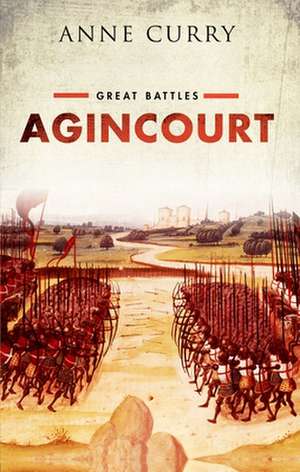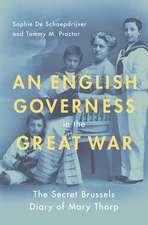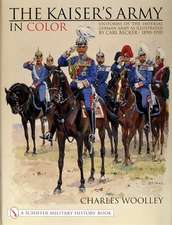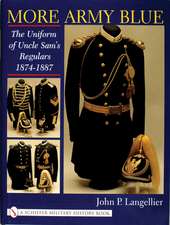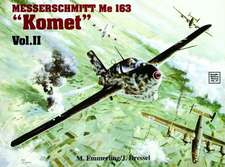Agincourt: Great Battles Series: Great Battles
Autor Anne Curryen Limba Engleză Paperback – 23 sep 2021
| Toate formatele și edițiile | Preț | Express |
|---|---|---|
| Paperback (1) | 70.33 lei 10-16 zile | +26.85 lei 5-11 zile |
| OUP OXFORD – 23 sep 2021 | 70.33 lei 10-16 zile | +26.85 lei 5-11 zile |
| Hardback (1) | 119.21 lei 31-37 zile | |
| OUP OXFORD – 27 aug 2015 | 119.21 lei 31-37 zile |
Preț: 70.33 lei
Preț vechi: 83.18 lei
-15% Nou
Puncte Express: 105
Preț estimativ în valută:
13.46€ • 14.09$ • 11.20£
13.46€ • 14.09$ • 11.20£
Carte disponibilă
Livrare economică 26 februarie-04 martie
Livrare express 21-27 februarie pentru 36.84 lei
Preluare comenzi: 021 569.72.76
Specificații
ISBN-13: 9780199681020
ISBN-10: 0199681023
Pagini: 272
Ilustrații: 25 b&w halftones, 5 maps
Dimensiuni: 136 x 215 x 16 mm
Greutate: 0.34 kg
Editura: OUP OXFORD
Colecția OUP Oxford
Seria Great Battles
Locul publicării:Oxford, United Kingdom
ISBN-10: 0199681023
Pagini: 272
Ilustrații: 25 b&w halftones, 5 maps
Dimensiuni: 136 x 215 x 16 mm
Greutate: 0.34 kg
Editura: OUP OXFORD
Colecția OUP Oxford
Seria Great Battles
Locul publicării:Oxford, United Kingdom
Recenzii
Review from previous edition Anne Curry analyses the evidence with the authority of the doyenne of Agincourt historians ... [an] excellent narrative of the fighting.
Nobody knows more about Agincourt than Anne Curry... Her new work addresses the reasons for Agincourt's enduring fame. Clearly, much of it was down to Shakespeare, who was at his roaring best when he dramatized Henry Vs day of triumph in the late 1590s, a time when the English public was especially hungry for cod-medieval jingo. What is less well known, but illustrated beautifully by Curry's book, is the fact that the immortalisation of Agincourt started long before Shakespeare.
Interesting, commendably accessible, and admirably well researched.
Curry compiles an exhaustive list of Agincourt's resonance throughout French and British letters and art, and she is especially incisive on the 600th anniversary of the battles about its evolving and often ambiguous message to the sometimes allied, sometimes warring French and British.
Gives a good account of Agincourt's after-life in Shakespeare's Henry V, and in myth, legend, literature and propaganda ...
Wonderfully accessible ... By exploring English history from a truly intriguing angle, Curry's insightful book shows us how the myth of Agincourt, harnessed by jingoism, has been used to convince the country on repeated occasions of its own invincibility. Fascinating stuff.
Entertaining and readable.
If one accepts that fact can be separated from fiction, Curry's Agincourt can hardly be bettered.
What can one learn from a 600-year-old battle? Quite a bit, as it turns out. Anne Curry's telling of the Battle of Agincourt, and her analysis of English King Henry V's leadership in that battle against the French, yields new insights not just about the battle itself, but about how the memories and myths that surround it have influenced both personal and national identities.
does an admirable job of showing how national identity, myth-making, and popular culture can influence the historical narrative ...
This is as much a book for the non-specialist as for the historian or enthusiast. Professor Curry writes in a style that is eminently readable. Highly recommended.
There are many books about Agincourt, but few authors can claim to have contributed as much to the subject as the industrious Anne Curry.
Forget Laurence Olivier or Kenneth Branagh, or even Shakespeare, and instead feast on this historical extravaganza which tells how the battle was fought, how the protagonists lined up and what was actually achieved by the great victory.
Curry is fascinating both on how Shakespeare adapted his source material for Henry V and on how the battle, our perceptions often governed by Shakespeare, has been used, often for propaganda, right through to the present day.
Anne Curry's brilliant historiographical discussion traces how the myth of Agincourt and the image of a small but doughty force prevailing against incredible odds have become in no small part because of Shakespeare embedded in our national consciousness. Having written on Agincourt before, Curry knows the scholarly debate well... [A] fascinating account of the battle and its mythology.
splendid
Nobody knows more about Agincourt than Anne Curry... Her new work addresses the reasons for Agincourt's enduring fame. Clearly, much of it was down to Shakespeare, who was at his roaring best when he dramatized Henry Vs day of triumph in the late 1590s, a time when the English public was especially hungry for cod-medieval jingo. What is less well known, but illustrated beautifully by Curry's book, is the fact that the immortalisation of Agincourt started long before Shakespeare.
Interesting, commendably accessible, and admirably well researched.
Curry compiles an exhaustive list of Agincourt's resonance throughout French and British letters and art, and she is especially incisive on the 600th anniversary of the battles about its evolving and often ambiguous message to the sometimes allied, sometimes warring French and British.
Gives a good account of Agincourt's after-life in Shakespeare's Henry V, and in myth, legend, literature and propaganda ...
Wonderfully accessible ... By exploring English history from a truly intriguing angle, Curry's insightful book shows us how the myth of Agincourt, harnessed by jingoism, has been used to convince the country on repeated occasions of its own invincibility. Fascinating stuff.
Entertaining and readable.
If one accepts that fact can be separated from fiction, Curry's Agincourt can hardly be bettered.
What can one learn from a 600-year-old battle? Quite a bit, as it turns out. Anne Curry's telling of the Battle of Agincourt, and her analysis of English King Henry V's leadership in that battle against the French, yields new insights not just about the battle itself, but about how the memories and myths that surround it have influenced both personal and national identities.
does an admirable job of showing how national identity, myth-making, and popular culture can influence the historical narrative ...
This is as much a book for the non-specialist as for the historian or enthusiast. Professor Curry writes in a style that is eminently readable. Highly recommended.
There are many books about Agincourt, but few authors can claim to have contributed as much to the subject as the industrious Anne Curry.
Forget Laurence Olivier or Kenneth Branagh, or even Shakespeare, and instead feast on this historical extravaganza which tells how the battle was fought, how the protagonists lined up and what was actually achieved by the great victory.
Curry is fascinating both on how Shakespeare adapted his source material for Henry V and on how the battle, our perceptions often governed by Shakespeare, has been used, often for propaganda, right through to the present day.
Anne Curry's brilliant historiographical discussion traces how the myth of Agincourt and the image of a small but doughty force prevailing against incredible odds have become in no small part because of Shakespeare embedded in our national consciousness. Having written on Agincourt before, Curry knows the scholarly debate well... [A] fascinating account of the battle and its mythology.
splendid
Notă biografică
Anne Curry is Professor of Medieval History and Dean of the Faculty of Humanities at the University of Southampton, after teaching for many years at the University of Reading. She has published many books and articles on the Hundred Years War, as well as definitive works on Agincourt itself and an on-line database of all known soldiers between 1369 and 1453 (www.medievalsoldier.org ). An historical advisor to the battlefield centres at Azincourt, Shrewsbury, and Bosworth, she is co-chair of the 'Agincourt 600' committee, tasked with organizing the commemorations of the sixth hundredth anniversary of the battle. President of the Historical Association between 2008 and 2011, she is also a former Vice-President of the Royal Historical Society.
